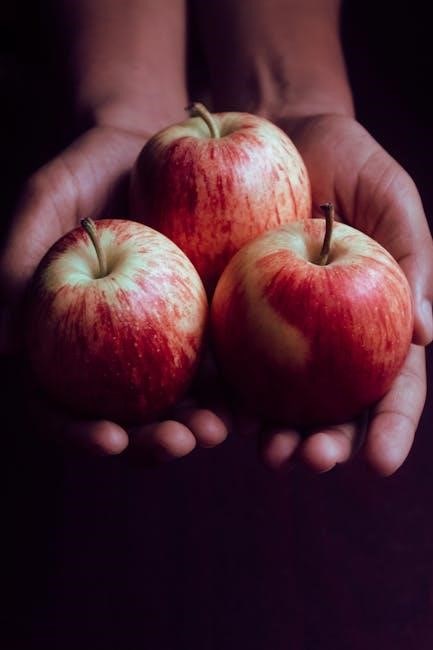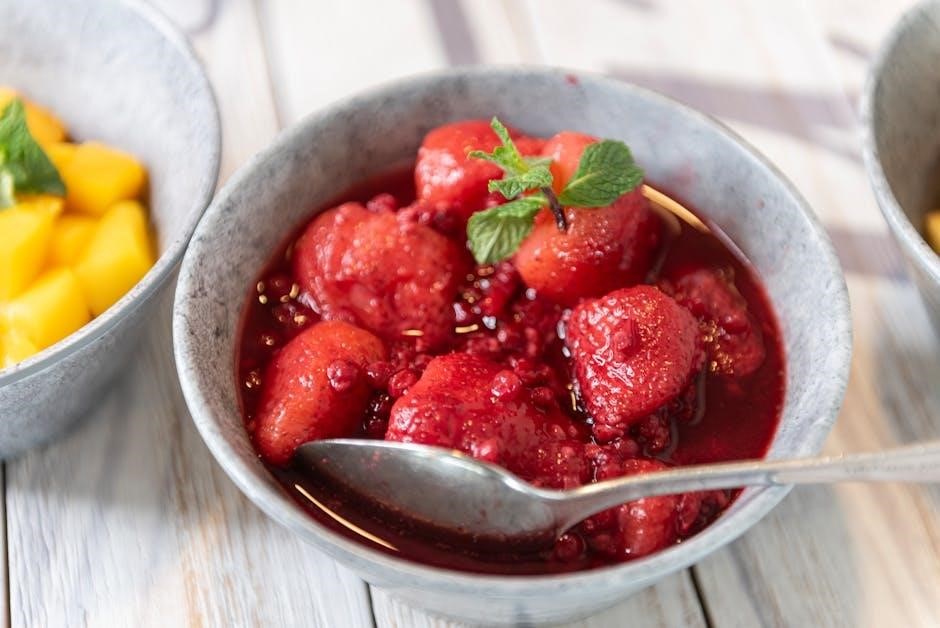
sugar free food list pdf
Embracing a sugar-free lifestyle focuses on eliminating added sugars‚ emphasizing whole foods like vegetables‚ lean proteins‚ and healthy fats. This approach promotes improved health‚ weight management‚ and reduced chronic disease risks.
1.1 Why Choose a Sugar-Free Lifestyle?
Adopting a sugar-free lifestyle offers numerous health benefits‚ including weight loss‚ improved blood sugar control‚ and reduced risk of chronic diseases like diabetes and heart disease. It helps eliminate energy crashes and supports mental clarity. By removing added sugars‚ you focus on nutrient-dense foods‚ promoting better digestion and overall well-being. This approach also encourages healthier eating habits‚ helping you make more mindful food choices. A sugar-free diet is a sustainable way to enhance long-term health and vitality.
1.2 Benefits of a Sugar-Free Diet
A sugar-free diet provides significant health improvements‚ such as stabilized blood sugar levels and enhanced energy levels. It reduces inflammation‚ improving skin health and minimizing acne. This diet also supports weight loss by eliminating empty calories from added sugars. Additionally‚ it lowers the risk of developing type 2 diabetes and heart disease. By focusing on whole‚ nutrient-rich foods‚ a sugar-free diet promotes better digestion and overall well-being. It fosters a healthier relationship with food‚ leading to more balanced and sustainable eating habits over time.
Comprehensive Sugar-Free Food List
A detailed guide to sugar-free eating‚ including vegetables‚ fruits‚ lean proteins‚ and healthy fats‚ ensuring a balanced and nutrient-rich diet without added sugars.
2.1 Vegetables: Non-Starchy Options
Non-starchy vegetables are low in calories and natural sugars‚ making them ideal for a sugar-free diet. Options include broccoli‚ spinach‚ asparagus‚ and leafy greens like kale and lettuce. These vegetables are rich in vitamins‚ minerals‚ and antioxidants‚ providing essential nutrients while keeping blood sugar levels stable. They can be enjoyed raw‚ roasted‚ or steamed‚ offering versatility in meal preparation. Incorporating these vegetables into your diet supports overall health and helps maintain a balanced nutritional intake without added sugars.

2.2 Fruits: Low-Sugar Varieties
Focusing on low-sugar fruits is key to a sugar-free diet. Berries like strawberries‚ blueberries‚ and raspberries are excellent choices due to their lower sugar content and high antioxidant levels. Citrus fruits such as oranges and grapefruits are also great options‚ offering natural sweetness without excessive sugar. Apples and pears‚ while containing natural sugars‚ are best enjoyed in moderation. These fruits provide essential vitamins and fiber‚ supporting overall health and satisfying sweet cravings without compromising dietary goals. Incorporate them into meals or snacks for a balanced and nutritious approach.

2.3 Protein Sources: Animal and Plant-Based
Incorporating a variety of protein sources is essential for a balanced sugar-free diet. Animal-based options include lean meats like chicken‚ turkey‚ and grass-fed beef‚ as well as fish such as salmon and cod‚ which are rich in omega-3 fatty acids. Eggs and Greek yogurt are excellent choices for their high protein content and minimal sugar. Plant-based alternatives like tofu‚ lentils‚ and chickpeas provide ample protein without added sugars. These options support muscle health and keep you fuller longer‚ making them ideal for a sugar-free lifestyle.
2.4 Healthy Fats: Nuts‚ Seeds‚ and Oils
Healthy fats are crucial for a sugar-free diet‚ providing sustained energy and supporting heart health. Nuts like almonds‚ walnuts‚ and pecans are rich in healthy fats and fiber. Seeds such as chia‚ flax‚ and sunflower offer omega-3 fatty acids and antioxidants. Oils like olive‚ avocado‚ and coconut are excellent for cooking and dressings‚ as they are low in sugar and high in beneficial fats. These options enhance meals‚ promote satiety‚ and are versatile for various culinary uses‚ making them a great addition to a sugar-free lifestyle.
Grains and Starches
Focus on low-carb‚ gluten-free grains like quinoa‚ almond flour‚ and cauliflower rice. These options are rich in nutrients and fiber‚ supporting a balanced sugar-free diet.
3.1 Gluten-Free and Low-Carb Grain Options
For a sugar-free diet‚ opt for gluten-free and low-carb grains like quinoa‚ almond flour‚ and coconut flour. These alternatives are rich in fiber and nutrients‚ supporting a balanced diet without added sugars. Incorporate rice noodles‚ black bean pasta‚ and zucchini noodles for versatile meal options. Always check labels to ensure no added sugars or gluten‚ making these grains ideal for maintaining a healthy and sugar-free lifestyle while providing essential nutrients.
Dairy Products
Dairy options like plain yogurt‚ cottage cheese‚ and unsweetened milk are excellent for a sugar-free diet‚ offering protein and calcium without added sugars. Choose wisely to maintain health benefits while avoiding sugary additives.

4.1 Sugar-Free and Low-Lactose Dairy Choices
For a sugar-free diet‚ opt for unsweetened‚ full-fat dairy products like plain Greek yogurt‚ cottage cheese‚ and heavy cream. These options are naturally low in lactose and added sugars‚ making them ideal for those avoiding dairy sugars. Additionally‚ hard cheeses like cheddar and Parmesan are great choices‚ as they contain minimal lactose and no added sugars. Always check labels to ensure no hidden sugars are present‚ and consider lactose-free varieties if necessary. These dairy selections support a healthy‚ balanced diet without compromising on flavor or nutrition.

Beverages
Opt for water‚ herbal teas‚ and black coffee. Unsweetened almond milk and seltzer are excellent choices. Avoid sugary sodas and juices‚ focusing on naturally sugar-free drink options instead.
5.1 Sugar-Free Drink Options
Staying hydrated while avoiding sugar is easy with options like water‚ herbal teas‚ and black coffee. For something fizzy‚ try seltzer or sparkling mineral water with a squeeze of fresh lime or lemon. Unsweetened almond milk and green tea are also great choices‚ offering nutrients without added sugars. Avoid sugary sodas‚ fruit juices‚ and sweetened beverages. Infused water with cucumber‚ mint‚ or berries adds flavor naturally. These drinks support a healthy lifestyle while keeping sugar intake minimal‚ aligning perfectly with a sugar-free diet plan.

Meal Planning Tips
Plan weekly meals‚ avoiding added sugars‚ and focus on fresh‚ nutrient-dense foods. Use a shopping list to stay organized and ensure balanced‚ sugar-free nutrition.
6.1 Sample 7-Day Meal Plan
Start your week with scrambled eggs and spinach. Lunch on grilled chicken salad with olive oil. Snack on almonds and veggies with hummus. Dinner: baked salmon and broccoli.
Day 2: Avocado smoothie for breakfast‚ turkey lettuce wraps for lunch‚ celery with almond butter as a snack‚ and beef stir-fry for dinner.
Day 3: Spinach omelette‚ chicken Caesar salad‚ cucumber slices with guacamole‚ and pork chops with green beans.
Day 4: Greek yogurt with berries‚ tuna salad‚ mozzarella sticks‚ and zucchini noodles with meat sauce.
Day 5: Fried eggs and tomatoes‚ chicken breast with asparagus‚ macadamia nuts‚ and shrimp skewers.
Day 6: Smoothie bowl‚ steak salad‚ hard-boiled eggs‚ and roasted chicken thighs.
Day 7: Omelette with mushrooms‚ cod with cauliflower rice‚ and a caprese salad.

Snacks and Treats
Enjoy guilt-free snacking with options like almonds‚ veggie sticks‚ and dark chocolate. Sugar-free treats such as homemade granola or chia pudding satisfy cravings without added sugars.
7.1 Healthy Sugar-Free Snack Ideas
Discover delicious and nutritious sugar-free snacks to curb cravings. Options include fresh veggie sticks with hummus‚ nuts like almonds or walnuts‚ and seeds such as pumpkin or chia. Try “ants on a log” with celery‚ almond butter‚ and sugar-free raisins. Sugar-free granola with unsweetened yogurt or berries is a satisfying choice. For sweet treats‚ enjoy dark chocolate (at least 85% cocoa) or homemade chia pudding. These snacks are not only healthy but also keep you full and energized throughout the day without compromising your sugar-free lifestyle.
A sugar-free diet offers numerous health benefits‚ including weight management and reduced disease risks. By focusing on whole foods‚ you can sustain this lifestyle long-term effectively.
8.1 Maintaining a Sugar-Free Diet Long-Term
Maintaining a sugar-free diet long-term requires commitment and strategic planning. Start by setting realistic goals and gradually reducing sugar intake to avoid cravings. Meal prepping and stocking your pantry with approved foods ensure consistency. Stay hydrated‚ as thirst is often mistaken for hunger or sugar cravings. Be mindful of hidden sugars in processed foods and opt for whole‚ nutrient-dense alternatives. Building a support system‚ like joining sugar-free communities‚ can also help. Celebrate small milestones to stay motivated and remind yourself of the health benefits‚ such as improved energy and reduced inflammation. Over time‚ your taste buds will adapt‚ making it easier to sustain this lifestyle;